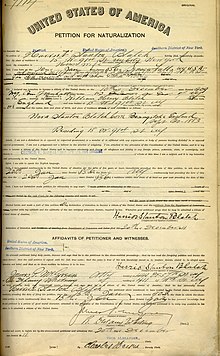Expatriation Act of 1907
[1][7] Section 1 provided for the issuance of non-renewable alien's passports of six months' validity to non-citizens who had lived in the United States for three years and had made a declaration of intention to become U.S. citizens.[4][9] The background of this section goes back to a 1906 recommendation by the House Committee on Foreign Affairs that the State Department form a commission of inquiry on the subject of nationality laws and their relation to US citizens living abroad.Acting Secretary of State Robert Bacon named international law expert James Brown Scott, Minister to the Netherlands David Jayne Hill, and Passports Bureau chief Gaillard Hunt to the commission.[11] In addition to the provisions which actually ended up in the Act, the commission had also recommended that persons wishing to re-acquire US citizenship "be required to comply with the laws applicable to the naturalization of aliens".[1] The Act states that an American woman who marries an alien would lose her citizenship and take on her husband’s nationality.[15][16] As a result of her loss of citizenship, she forfeited her constitutional rights and could be subject to deportation and denial of reentry to the United States.[19][15] An act of Congress in 1855 had granted automatic citizenship to alien wives of men who were American citizens, native born or naturalized.Those women residing abroad at the end of their marriage, were required to register as an American citizen at a US consulate, within one year, in order to retain their citizenship.However, with the outbreak of WWI, the focus on American wives of alien husbands turned toward questions concerning their patriotic loyalty and the bill was not passed.Section 6 provided that children born abroad to U.S. citizen parents would be required to swear an oath of allegiance before a U.S. consul upon reaching the age of majority if they wished to retain U.S.However, she had been denied voter registration by the respondent in his capacity as a Commissioner of the San Francisco Board of Election on the grounds of her marriage to a Scottish man.Justice Harold Hitz Burton, writing the majority opinion, reversed the District Court and found that the petitioner had indeed lost U.S. citizenship.

59th United States CongressStatutes at LargeUnited States Supreme CourtMackenzie v. Hare59th Congressrelinquishment of United States nationalityAmericans residing abroadad hocState DepartmentExpatriation Act of 18688 U.S.C.Nationality Act of 1940dual citizenshipPresident Ulysses S. GrantNellie GrantAct of 1868David Jayne Hillalien's passportsU.S. citizensHouse Committee on Foreign AffairsRobert BaconJames Brown ScottMinister to the NetherlandsGaillard HuntTalbot v. JansonHamilton Fishconstitutional rightsdeportationenemy alienOffice of Alien Property CustodiannaturalizationAmerican consulHarriot Stanton BlatchInez MilhollandCrystal EastmanJeannette RankinNineteenth amendmentwomen's suffrage movementCable Actposthumously restore citizenshipAl Frankenresolutionoath of allegianceSupreme CourtFourteenth AmendmentJoseph McKennaJames Clark McReynoldsItalian citizenHarold Hitz BurtonWayback MachineEnrollment Act of 1865Library of Congress